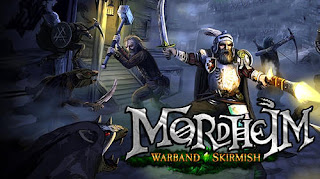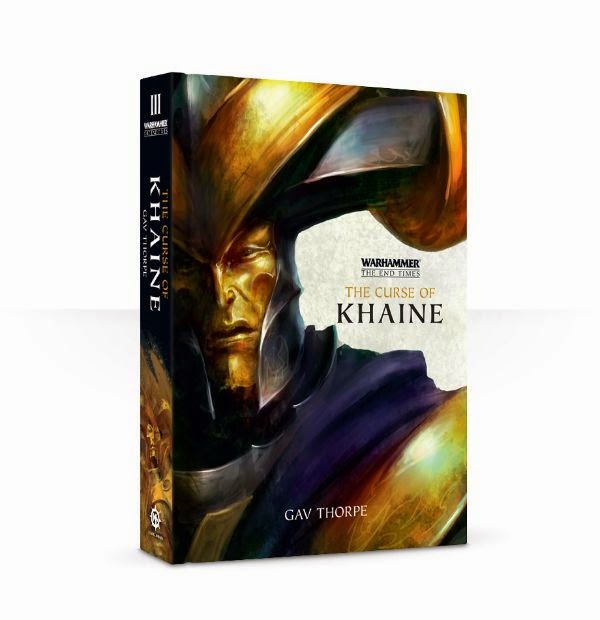Xathrodox86 reviews: "Warrior Priest" by Darius Hinks
I always liked Warrior Priests. Funny, since personally I'm not a very religious or spiritual man, but for some reason, in almost every fictional universe, the idea of holy men and women fighting evil in the name of their gods, appeals to me.
That's why I have 4 Warrior Priests of Sigmar in my Warhammer Army, alongside a priest of Morr and a of Myrmidia. Like I've said, there's something undeniably cool about those type of heroes, so I did not hesitate in picking up the "Warrior Priest" novel, written by Darius Hinks, which also granted him the Morningstar 2011 award (David Gemmell Legend Awards). Fortunately, once again my choice has been a right one, as "Warrior Priest" was easily one of the best Warhammer Fantasy books that I've ever read. |
| A great piece of fantasy fiction indeed |
"Warrior Priest" is written in a very interesting manner, which combines the elements of both an investigation-type story with a military fiction. Fitting, since it is a part of the Empire Army novel series, but while other books from this range are more focused on battles and combat, this mixes in personal struggle, family drama and questions about blind faith and the damage that it can do. There's no denying the blind zeal, that pushes Wolff forward, to confront his evil brother, but Hinks also shows just how much harm, can a blind faith actually cause. "Sigmarite dogma does not preach forgiveness" growls young Jacob to his brother, in a retrospective part of the book, and that single line shows just how little different, the servants of Order truly are from their sworn enemies. Darius Hinks perfectly encapsulated the dangers of fanaticism, whether it comes from serving the Dark Gods of Chaos, or the First Emperor. Without spoiling anything, I just want to say this - after reading this novel, I've begun to look on the Warrior Priests of the Empire in a slightly different way. Not always wading in with a huge hammer, while shouting prayers to Sigmar, can be a good thing, as Wolff finds out the hard way, during the course of his story.
It should also be noted that Fabian, Jakob's younger brother, is probably one of the better written vilians in any Warhammer story. Around the middle of "Warrior Priest's" plot, we recieve a huge retrospection, taking us to the times of both brothers youth in the harsh and unforgiving province of Ostland. We see that Jakob, a highly pious and spiritual youg man, is clealry favortised by his equally religious father. Fabian, the other sibling, is seens as weak and useless, spending whole days reading books about legends and folk tales, while Jakob makes his way up the structures of sigmarite clergy. By a pure, blind chance, the Wolffs travel to Altdorf, to meet with high priests of the Temple of Sigmar, and drop Fabian off at the place of his eccentric uncle. Soon, the young man discoveres that the old man harbors many secrets, which he's willing to share with him. The road to damnation begins with Fabian accompanying his uncle on the streets of the Empire's capital, learning about secret societies, hidden libraries and things, that should remain hidden. The author presents this slow decline into heresy in a truly excellent manner. It is never explained if Fabian's uncle and his friends are cultists, or are they only fascinated by the unknown. The author leaves a few clues here and there, but it's up to the reader to make the final verdict. Hinks also shows just how often a man can become corrupted, just by pure chance or accident. Fabian wasn't a malevolent, daemon-worshipper from his earliest days. No, he became one by pure chance and the fact that his family was cold and distant towards him. Not often are servants of Chaos presented in such a way, and it is a testament to Darius Hinks talent, that he managed to write an antagonist, that's not only human, but also relatable. Good job Mr. Hinks.
 |
| Usually the Old World bad guys are less... subtle about being evil a-holes |
Also worth noting is the character of Anna. As a priestess of the Goddess of Mercy, her observations and insights on Wolff's methods and motivations, present a really nice contrast to the Warrior Priest's harsh and unforgiving philosophy. The banter between those two provided some of the most interesting points of this book.
The ending, when it comes, is both satisfying and highly melancholic, just like the ending to any Warhammer Fantasy book should be, in my opinion. However there's a sort of "after the credits" scene, and it is... weird. Without spoiling anything, I don't really think that this one was completely necessary and looked more like an eventual sequel hook. Given that the book was released back in 2010, and in the meantime the Old World was blown up by a bad case of shitty writing, any continuation of Jakob Wolff's adventure seems unlikely. Shame, because a lot of time has passed, since I've read a Warhammer novel that got me so interested in its plot and heroes. I know that Darius Hinks also wrote a couple of other stories for the Black Library, including a book about Sigvald the Magnificent, the Orion trilogy and some Space Marine action. After finishing "Warrior Priest", I can safely say that it is fully worth it to check his other works.
 |
| Great job Mr. Hinks! |
- A set of interesting, fleshed out heroes.
- The main villain is interesting, well written and relatable.
- Teaches about the dangers of blind faith and fanaticism.
- Combat is brutal and visceral.
Cons:
- That one ending scene was completely unnecessary. You'll know which one I'm talking about, once you'll finish the book.
- While the combat scenes were really good, there were not that many of them. For some that can be dissapointing, especially since this is an Empire Army novel.
Until next time!
Xathrodox86



Comments
Post a Comment
Thank you for the comments!